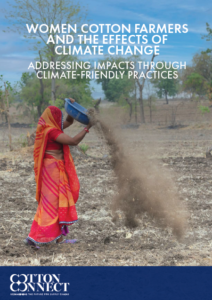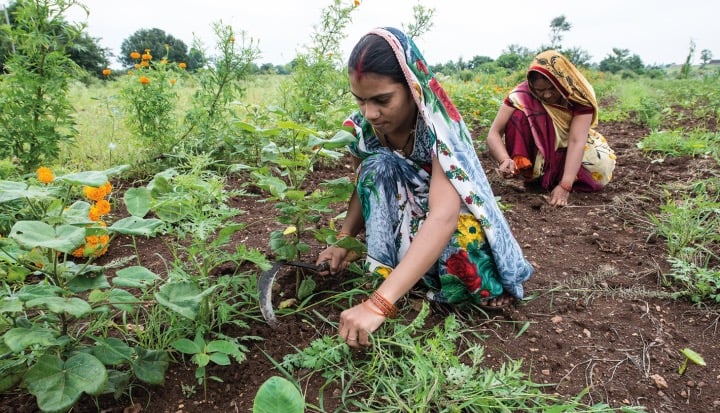In cotton, women play a significant role in building sustainable, productive and resilient farms. From planting seeds to nurturing and harvesting crops, women are at the beating heart of smallholder farming that is the source of much high-quality raw material supplied to global retail buyers and made into the cotton clothes we love to buy and wear.
According to FAO estimates, women make up 45% of the agricultural workforce in developing nations. In Africa and Asia, it’s more like 60%. They’re responsible for the bulk of tasks. Their skilful hands and intimate knowledge of traditional farming practices often result in higher yields and healthier crops.
But these women are under pressure.

We’ve just conducted interviews with over 100 women farmers and programme partners across India, Pakistan and Bangladesh. We did a similar exercise three years ago. We want to understand how women are coping in the face of climate change so that we can better target our programmes to support them, and take actions that will empower them and close the gender gap.
We found that problems related to climate change continue to daunt the lives of women farmers in all regions. Changing weather patterns, droughts and floods are devastating crops. Rising temperatures, invasive pests, and more frequent extreme weather events are undermining the livelihoods of those reliant on agriculture.
There is an effect on the farm, but the impacts of climate change are also being felt at home, significantly affecting women’s physical and mental well-being. Our conversations revealed that women farmers experience heightened stress and often feel a lack of support or understanding. This feeling is heightened by the fact that women carry out more than 75% of unpaid care work – or 3.2 times more than men. Regardless of what they are going through, women have to take care of their families and shoulder the bulk of responsibilities. “No one takes care of us when we are sick. As women, it is expected that we look after everyone regardless,” one woman farmer told us in Madhya Pradesh, India.
Overall, women tell us they feel gender inequalities arising from traditional gender roles limit their decision-making power, access to education, training, and credit facilities – all of which present significant barriers to overcoming challenges posed by climate change. These gender-specific inequalities compound the difficulties faced by women in farming, making it harder for them to adapt and build resilience on their farms. Despite the significant contributions they make in cotton, women’s essential role often goes unrecognised. And this lack of recognition means they are often overlooked when it comes to being targeted for training or resources that might help them build climate resilience in their communities.
We know these things, having worked closely with hundreds of thousands of amazing women farmers over the last 14 years. In fact, more than 164,000 women have taken part in our Women in Cotton programmes, empowering them through training and education in everything from health and rights to running their own businesses.
We’re giving them training, knowledge and skills in sustainable agricultural practices and climate change awareness. We set up our Women Climate Change Ambassadors Programme in 2022 to build capacity in climate-smart agriculture through training. During the pilot programme, just 42 women took part. But each of them trained 30 farmers, sharing the knowledge to more than 1,000 women, quickly scaling the reach and impact.
We’re helping women farmers build on their existing knowledge and awareness of climate-resilient agriculture practices, such as intercropping and agroforestry, and encouraging the setting up of input centres near to their fields so they can more easily buy reliable and affordable organic pesticides, insecticides and fertilisers.
I’m especially excited about CottonConnect’s Women Entrepreneurship Development Programme which is empowering women to diversify from simply cotton farming in order to generate new income streams from activities such as soil testing and cattle rearing.
You can read these stories and more in our Report at https://www.cottonconnect.org/resources-hub/https/static1squarespacecom/static/5ff5d85f409193661a071749/t/618e1c61ad85ee75ac4ab287/1636703340573/ccginnerspdf-6atat.
We will continue listening to women farmers, and I’m proud of the interventions we are making to empower women in cotton. Women are not victims; they just need to be given the tools to succeed, not only in farming but in running their finances, improving their health and wellbeing, and developing the confidence to share their learning with others.
Climate change impacts everyone, but its impact on women is more pronounced, and can perpetuate and magnify structural inequalities in many corners of the globe. As we leverage insights from our programmes to develop scalable, replicable models, our ultimate aim is to create climate-resilient farming communities. Empowering women farmers is at the heart of this vision.










